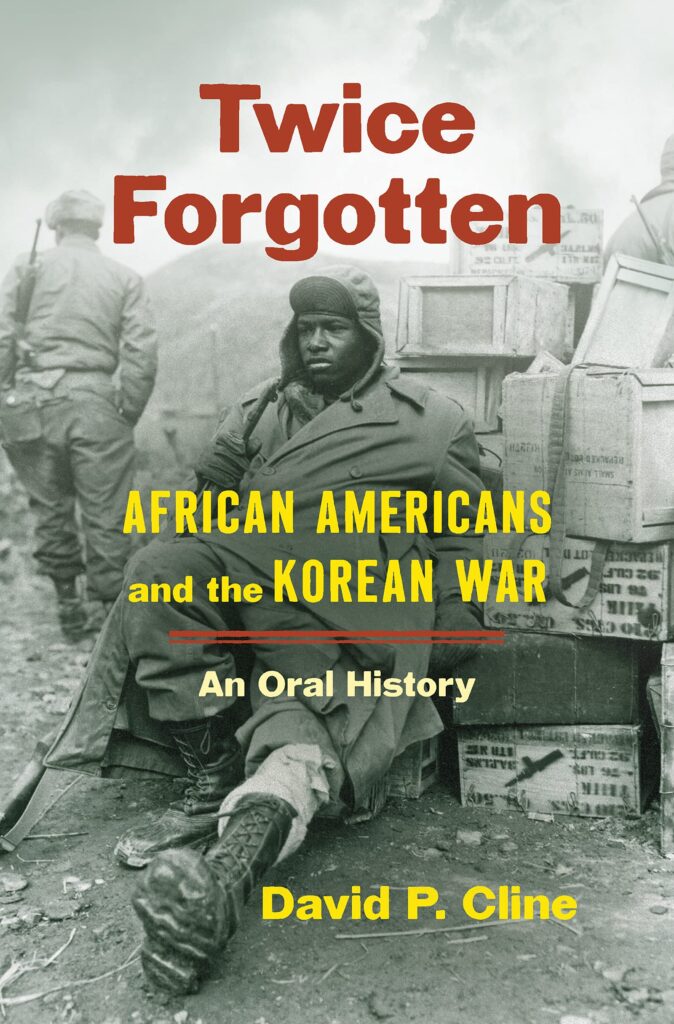
“In this exceptionally researched volume, Cline shows that the act of desegregating was far more complicated than expected…Readers will appreciate the wide variety of voices represented, including various military branches as well as officers and enlisted men and women from different regions of the United States…This is an essential, insightful read on an often-overlooked subject, for those interested in military history and African American history.”
–Library Journal [Starred Review]
“As the first comprehensive oral history of the African American experience in the Korean War, Twice Forgotten is an important contribution to Korean War history, military history, and African American history. By foregrounding the African American war experience, I expect it will prove as significant to Korean War history as Wallace Terry’s oral history Bloods was for the Vietnam War. By framing the Korean War as both a critical battle in the Civil Rights Movement …and an experience that forged the identity of a generation of future civil rights activists, Cline makes a convincing case for centering the experience of African Americans who served in the Korean War into the historical memory.” –Diplomatic History
“Cline has made a major contribution not only to military history but also to the history of the American civil rights movement.” –The Journal of American History
“[An] immersive history [of] first-person accounts of Black soldiers. Richly detailed and thoughtfully presented, this is a treasure chest of insight into the Black military experience.”
–Publishers Weekly
“Compellingly argues that the participation of Black soldiers in the Korean War represented a crucial step toward racial equality within the United States military services, contributing significantly to the broader civil rights movement. The collective narratives of African American service men and women provide
a vital missing piece in comprehensively understanding the American civil rights movement. Cline skillfully interweaves the often-overlooked Korean War in the United States, much like a tactful weaver combines weft and warp to produce fabric. An intricate tale that vividly captures the struggles, frustrations, hopes, visions, sacrifices, and eventual empowerment of African American men and women who served in the United States military during the Korean War. The invaluable sacrifices of African American veterans in the Korean War are not forgotten, in part thanks to this book.” —The Oral History Review
“An impressive oral history of African American soldiers in the Korean War and the impact that these returning veterans had on the burgeoning Civil Rights Movement in the US. Drawing from a wealth of primary and secondary sources, including a plethora of oral histories conducted by the author, Cline highlights the nexus between the larger Cold War and the local battles against Jim Crow on the home front . . . .highly recommended.” —CHOICE (American Library Association)
“This comprehensive account of Black service in Korea makes an invaluable contribution to American military historiography and scholarship on the civil rights movement.”—Journal of Southern History
“Impeccably researched, the book does justice to its subject matter.” —Southwestern Historical Quarterly
“This is a majestic work, rigorously researched and compellingly argued. The first-person narratives of African American service members are nothing less than epic stories of struggle and survival, where the battle begins long before one even steps foot on the battlefield. Arriving at a time when military service, racial equity, and national security are once again part of the national debate, Cline’s book deserves a broad audience.”
–Paul Ortiz, author of An African American and Latinx History of the United States
“An outstanding and necessary book, Twice Forgotten makes a compelling argument for the Korean War as central to the mid-century civil rights movement. Lovely and clear, devastating and bracing, the book’s oral histories capture the perennial dilemma of Black soldiers fighting for a democracy denied them and the fearsome determination of those committed to change. Cline’s work offers a model for deep, compassionate, and righteous listening.”
–Adriane Lentz-Smith, author of Freedom Struggles: African Americans and World War I
“Drawing upon extensive archival and oral history research, this book offers a nuanced view of desegregation in the military, a deep examination of the Korean War experience from the African American perspective and, finally, a connection between the experiences of African American veterans and elements of the civil rights movement in the United States that both preceded and followed the Korean War. This is an ambitious undertaking and yet also an easy and enjoyable read. It offers a rich view of a topic in tremendous need of exactly this kind of comprehensive examination.”
–Doug Boyd, Director of the Louie B. Nunn Center for Oral History at the University of Kentucky Libraries
Leave a Reply